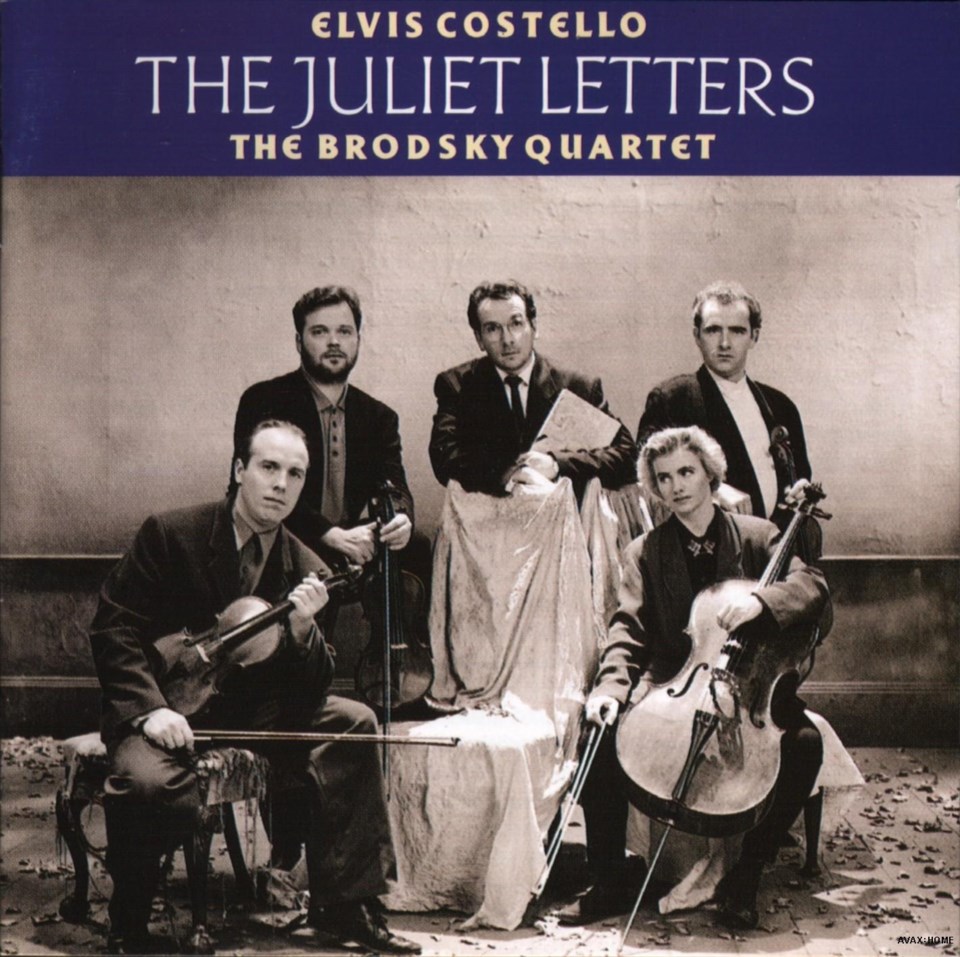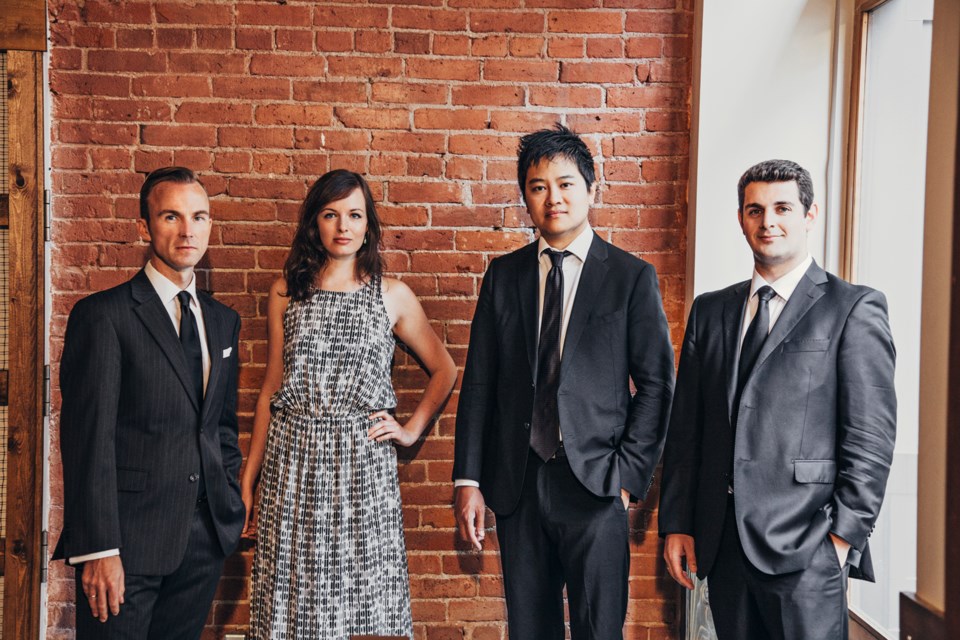The coming together of a string quartet is surely a marriage of passion. And, much like a marriage, a successful string quartet is also the product of patience and time.
“String quartet is famously long-journeyed,” says cellist Joseph Elworthy, cofounder of Vancouver’s Koerner Quartet, “so we wanted to spend the first couple of years really finding our voice and working on our craft before we, kind of ... publicly presented ourselves.
“Strictly speaking it’s our third season together, but this is our début season in many ways.”
Elworthy, speaking by phone from his post as executive director of the Vancouver Academy of Music (VAM), sounds more like a bashful suitor than a man discussing Mozart and Brahms, but there’s a reason he and his three contemporaries – Emilie Grimes (viola), Jason Ho (violin), and Nicholas Wright (violin) – have approached this season with such caution: String quartet is not a commitment to be taken lightly.
“The iconic string quartets have been around for 40 or 50 years,” says Elworthy. “[Often] with the founding members still in place.
But longevity isn’t the only aim. Elworthy views Vancouver as an emerging cultural mecca, and says he hopes that Koerner will become the string quartet synonymous with the city.
“Growing up in Vancouver, the string quartet of note was the Purcell String Quartet. Sadly,” he explains, “that name is not so familiar with concert-goers anymore, but they were really the resident string ensemble here in Vancouver. And it’s been almost 30 years since there’s been a successor.”
“I’m not saying that we’re necessarily that successor yet, he adds, “but that’s certainly our goal.”
Perhaps when we’re checking in with Elworthy in 40 or 50 years time, a secret of success in hindsight will have been ‘keeping things interesting’.
Case in point, on Feb. 15, the Koerner Quartet won’t be lulling lovebirds with the opuses and concertos of long gone Romeos – they’ll be sending out Notes of Love & Protest.
This unconventional program – a sure antidote to any accidental exposure to the saccharin – opens with the pixellated crimson shards of Vermillion by Jocelyn Morlock, one of Canada’s most commissioned new composers and the newly appointed composer-in-residence at the VSO.
“I read all these different descriptions of vermillion and thought, ‘This is perfect,’” says Morlock of the name. “Brilliant red, cinnabar, scarlet orange, red lacquer with flashes of acid green… I think it’s not so much about a love relationship as maybe one that went awry!” she jokes.
“Jocelyn always comes up with very inventive titles,” adds Elworthy. “Most of her titles, I have to look them up!”
Elworthy and Morlock are long-time collaborators themselves, Morlock having approached Elworthy to perform one of her most celebrated arrangements – an angelic double cello concerto called Aeromancy – and Elworthy having commissioned Morlock to compose a cello tribute to his Yale mentor Aldo Parisot.

Morlock is also currently the copyist and arranger for Elvis Costello, so it’s not surprising that the quartet’s musical valentine includes Costello’s acclaimed The Juliet Letters, an uncommon vocal work, sung in this performance by VAM baritone Alan MacDonald.
“There’s not a lot of works that incorporate voice and string quartet,” says Elworhty. “I think the string quartet as a genre is just such a perfect vehicle. You have literally the four voices of music that are merged together, so it’s always sort of like, why mess with perfection?” he laughs. “But it’s fun. It’s really nice to add this extra element in a work that, let’s be honest, is not a classical work. It’s genre-bending in a really unique way.”
Elworthy first heard Costello’s 1993 Brodsky String Quartet concept album while in university, and saw Valentine’s weekend as the perfect time to finally program it.
“Love letters can ramble in such a beautiful way,” he explains. “I love the text – it’s so immediate and direct. The fact that [Costello] is expressing love in its many different forms – some of the songs are quite mundane, you know, from just peculiarities of someone’s taste in food, or how they brush their hair, to another basically saying ‘my life is meaningless without you in it’.
“I love the gamut of the emotions expressed and I love the interplay of how you have the lead voice, but the quartet has a lot to say in the work, too,” he adds.
Costello is out of the country and won’t be able to attend this rare performance, but Morlock will.
Rounding out the afternoon as a challenging counterbalance is Benjamin Britten’s deeply moving String Quartet No. 2 In Time of War – a muted cry on the state of the world from the pacifist composer.
“This is a program that we were unabashedly daring in putting together,” says Elworthy. “Three 20th-century works, basically; a chamber music program that doesn’t have Brahms or Beethoven or Mozart....”
• Koerner Quartet presents Notes of Love & Protest, Feb. 15, 2pm at the Vancouver Academy of Music (1270 Chestnut). Tickets $18/$15.
Valentine's Q&A with Joseph Elworthy
What is the most passionate instrument? Oh, the cello, hands down. What other instrument can you hold and caress while you play, and you gauge the production of sound based on the amount of vibration it creates in your body?
What is the most romantic note on the scale? B flat. For me, that tingles because it can chafe so nicely against E natural.
And the most romantic classical song? If you Youtube the opening of Maurice Ravel’s Daphnis et Chloé, and you listen to the first minute of that work, which is depicting two star-crossed lovers experiencing sunrise... The word orgasmic is overused but this is so appropriate. Don’t do it in the office, wait until you get home.


